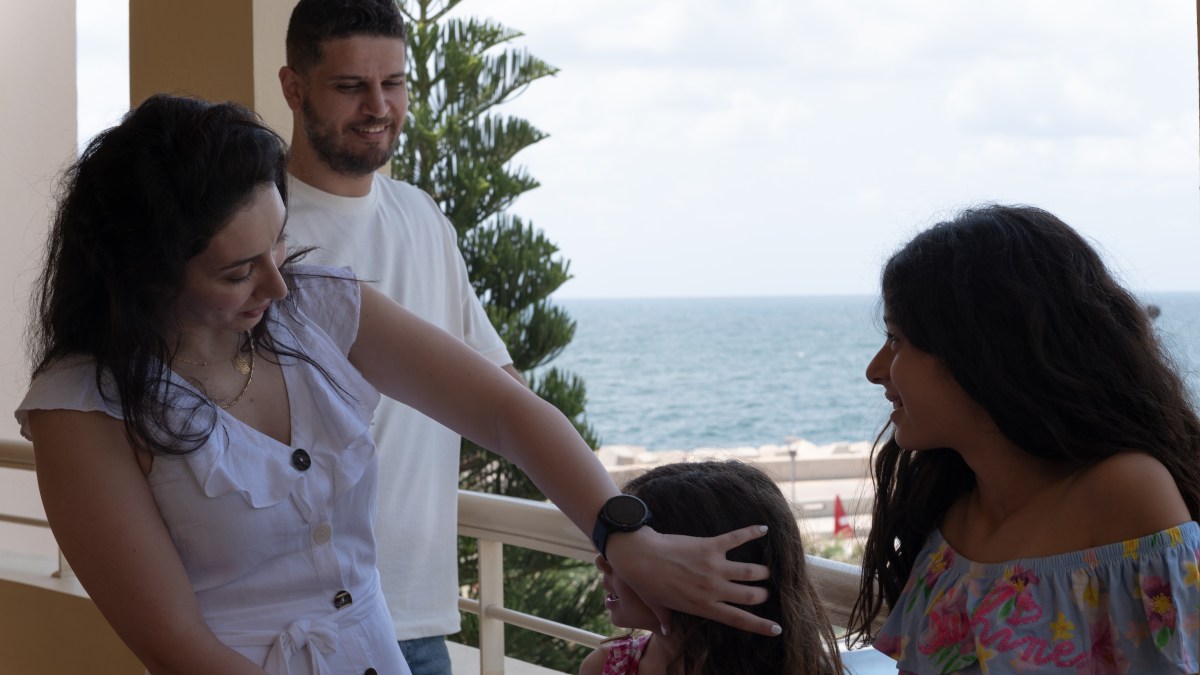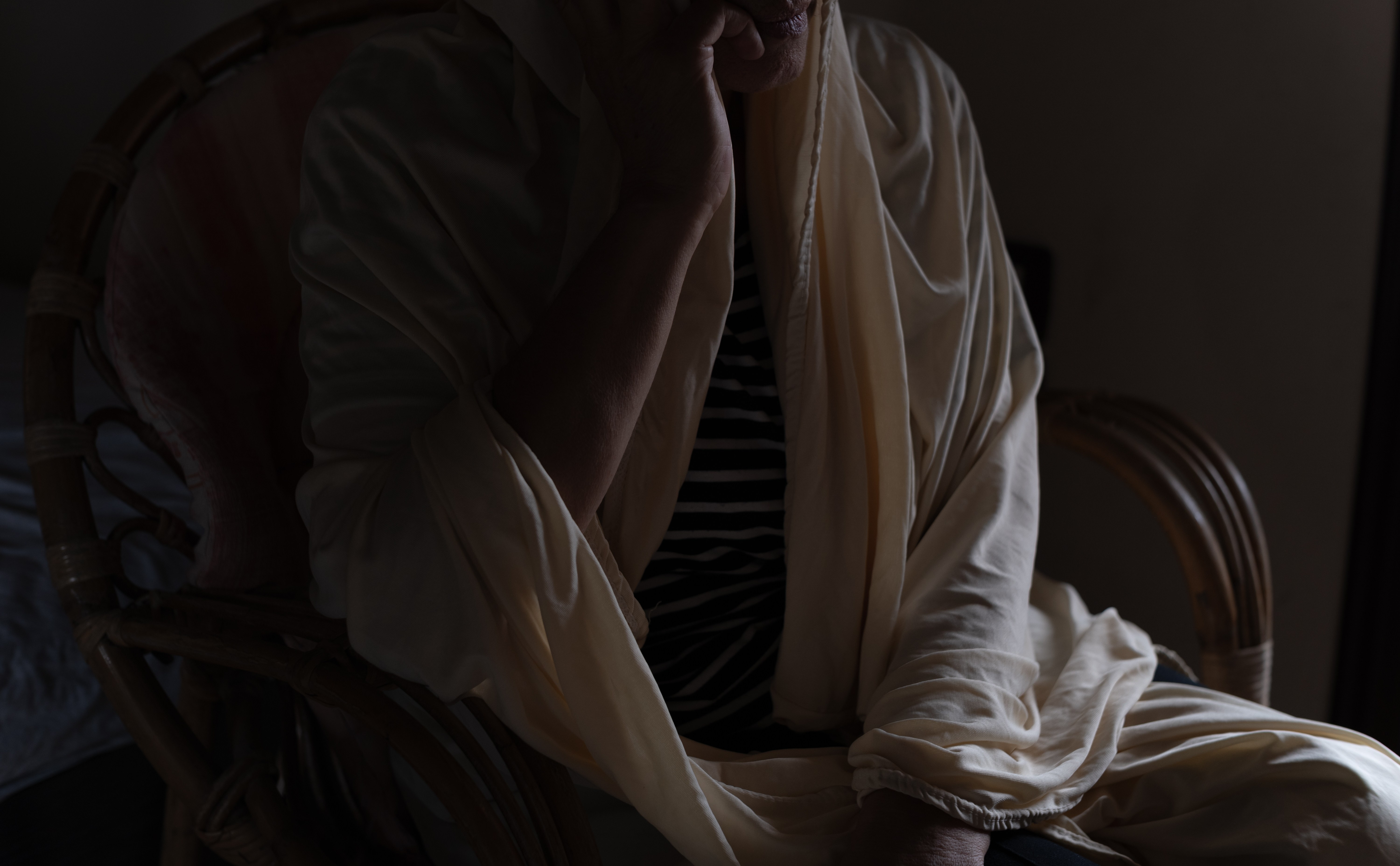As the Air Mediterranean flight touches down in Damascus, the passengers applaud and leap up, crowding the aisles, some waving the new Syrian flag, others in tears, as flight attendants try in vain to get them to return to their seats.
The plane is filled with Syrians returning home after years in exile, having fled Bashar al-Assad’s brutal dictatorship in fear of their lives. Some are with children who have never seen their home country. Among them are Ziad and Leen Janoudi, who live in exile in Ealing, west London, and their two daughters, Lynzzi, ten, and Sia, six, who had cartwheeled with excitement before boarding.
They have not seen most of their family for 14 years since Ziad, now 40, had to flee regime forces over the mountains into Turkey after deserting from the military and helping to organise some of the first protests against Assad.
They are returning to Latakia, a coastal town in the heartland of the Alawites, the minority Shia sect into which Assad and his father were born. About a tenth of the population, for years they held disproportionate influence and privilege, filling top positions in the military and security forces.
But while the Janoudis, who are Sunni, swim and play on the beach and revel in a new-found freedom, not far away Hala, a young Alawite woman, sits on a sofa in terror, recounting her ordeal at the hands of gunmen she believes were from government forces.
Last month Hala was crossing the road from her house to her parents’ home when three men bundled her into a van. They drove for three hours through checkpoint after checkpoint, without being stopped, until they came to an abandoned industrial facility where they left her in a room. “I begged for my mobile but they said we don’t want to hear from you,” she said. They held her there for seven days, raping her three times. When she protested, they laughed, “let Bashar al-Assad help you!”
Finally, they put her back in the van and dumped her on the roadside 50 miles inland. “They told me if I say anything, we will kill your son,” she said.
Many Alawite families remain in hiding amid growing violence
GABRIEL CHAIM FOR THE SUNDAY TIMES
Hala is one of dozens of Alawite women who have been abducted in recent months, following four days of violence in March that swept the coastal areas leaving more than 1,400 dead, most of them unarmed civilians. Among those killed were her younger brother and his friend, shot dead as they rode home on a motorbike.
Though the violence has abated, thousands of families remain in hiding, some of them in a nearby Russian airbase. Many more have fled the country to neighbouring Lebanon.
Ibrahim and Surad Suleiman, both in their sixties, and their son Somar, 35, have been moving from place to place for five months and now cower behind closed curtains in a borrowed apartment in Latakia.
Surad only ventures out wearing the hijab — a garment she had never previously worn. Somar, like many young Alawite men, had been hiding in the mountains but came back last week as his father needs open-heart surgery.
The trouble, he says, started shortly after the fall of Assad in December when Syrian army forces at a base and checkpoint near their farm in the village of Al-Sanobar were replaced by fighters from the new Sunni administration of President Ahmed al-Sharaa, a former jihadist and rebel commander.
President Saharaa of Syria is a former jihadist
KHALIL ASHAWI/REUTERS
“We might be Alawites but we are very poor, we got nothing from Assad. In fact Assad’s tourism minister seized some of our land so we were happy when he fell. But ten days later these gunmen started showing up, saying sectarian things.”
“They came to our homes, harassing people and preventing us harvesting our lemons and oranges, shouting ‘if our superiors don’t stop us we will slay you’,” said Somar.
Then on March 6 pro-Assad gunmen — referred to by the government as “remnants of the regime” — ambushed military personnel in and around Latakia, killing at least 16 members of the security forces.
The response was vicious.
An official fact-finding inquiry released last week found that 1,426 people were killed after about 200,000 fighters from all over Syria went to the coast to “avenge” the ambushed forces. Many were from unidentified groups including foreign jihadists who regard the Alawites as heretics.
Fighting between the new Syrian government and forces loyal to Assad’s regime broke out near Latakia in March
MOHAMAD DABOUL/AFP/GETTY IMAGES
The sectarian attacks against Alawites that followed included “extrajudicial killings, field executions, and systematic mass killings motivated by revenge” according to the Syrian Observatory for Human Rights.
The extended Suleiman family — 11 people in all — found themselves trapped in orchards between the road and the sea, hiding under trees for five days, eating leaves and shivering in the cold as shooting continued all around them.
• Syria returns to bloodshed: ‘I’m a mother who saw her sons killed’
From their hiding place they saw their neighbour killed and a woman shot in the face, among other atrocities.
When they were finally able to return home they found “everything looted and burnt, our cows killed, our farm tools and fishing equipment all stolen”.
“Fifty years’ work all gone,” he added, tears falling. “It was my son’s inheritance.”
The family now have nowhere to go. The security forces are still hunting young men and “arresting anyone suspected of being an Assad soldier”, Somar said. As an only son, he was exempt from military service — but now has no papers to prove this because everything in their house was burnt.
Young women are also living in fear.
A report by Amnesty International last week stated that the organisation has received “credible reports of at least 36 Alawite women and girls, aged between three and 40, abducted and kidnapped across Latakia and the coastal regions by unidentified individuals”. Some were picked up travelling to school or to visit relatives in broad daylight, or taken from their homes and drugged, then physically or sexually abused. They were allowed to return only after a ransom was paid.
Local activists put the number far higher. In Bustan al-Basha, a small Alawite town south of Latakia, from where Hala was snatched, three girls were abducted in just seven days last month.
The town is mostly empty. Some residents are still sheltering on the nearby airbase of Hmeimim where the Russian flag flies and Putin’s portrait hangs, though it is now guarded by troops from the very forces in Idlib that the Russians used to bomb. It was from here that Assad and his family were flown out to Moscow.
Among those who previously hid on the base was a young pharmacist called Reema, who has on her phone a photograph she knows she should not look at.
On the first day of the violence, she was on that phone to her fiancé Mohammed, a former soldier in the Assad forces who was walking in the woods with his cousin. “I was talking to him when I heard a shot and the call ended,” she said. A few minutes later she received a WhatsApp — a photo of her fiancé and his cousin lying dead.
Since taking power, Sharaa has spoken out repeatedly against sectarianism, saying he wants an inclusive and pluralist Syria.
The official fact-finding inquiry into the March violence concluded that the bloodshed was “not organised” and that military leaders did not directly order the attacks against Alawites.
Yet the massacres were then followed last month by open warfare with the minority Druze in the south which resulted in another 1,600 killings and the bombing of a Christian church in Damascus.
Sharaa’s western backers are growing increasingly uncomfortable at his apparent inability to control the various armed groups, jihadists and former rebels that now make up the security forces. Many of them, including those in Sharaa’s own group, Hayat Tahrir al-Sham, previously affiliated to al-Qaeda, openly talk of killing “Alawite and Druze pigs”.
Back at the beach in Latakia a reunion is taking place. Since fleeing Syria in 2011, Ziad Janoudi had not seen his only sister, Loujain, or ever met her daughter Juri, his niece, who is now 11. When he walked through Loujain’s door ten days ago, after driving through the early hours from the airport, she burst into tears. “Am I dreaming, am I dreaming?” she cried as she kept touching him.
Latakia, where violence against Alawites has come alongside the return of exiled Syrians
GABRIEL CHAIM FOR THE SUNDAY TIMES
When he left in December 2011, neither imagined it would be so long. Ziad expected Assad to fall within months. Instead the civil war intensified and the dictator clung on.
“To be honest we had given up hope,” said Ziad, who now works as a broadcast engineer for Warner Bros in London. “I thought Assad would be there for ever and we were never coming back.”
“I had been hesitating to tell my daughters about Syria as I thought they may never see it,” said Leen. “I was shivering when we arrived. To see my family again and for our daughters to meet them is amazing.”
One sadness for Ziad was seeing his father. “He’s like skin and bones,” he said, “he was dragged so many times to be interrogated about me by the secret police that he’s just broken.”
Asked about what is happening now to members of the Alawite sect who tortured them, he shrugged. “We need justice, not killing,” he said. “This is what we lived through, our people kidnapped, our businesses seized. Most of my friends were tortured to death and killed in prison. I know more dead people than living.”
Some names have been changed for protection




